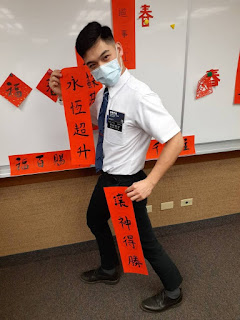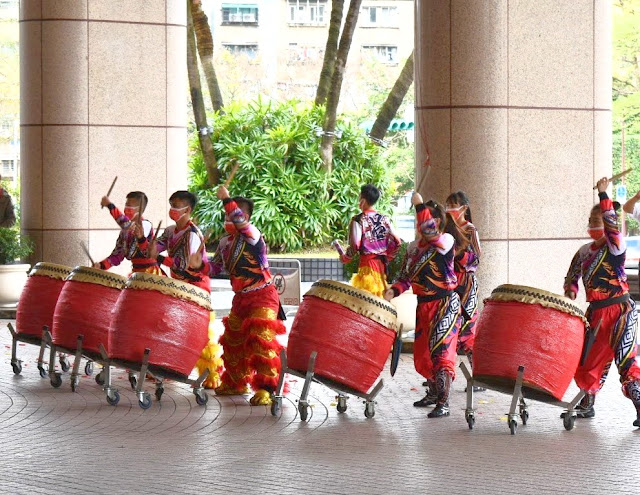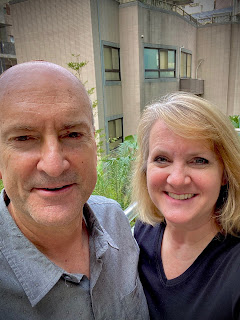Chinese New Year/ Guo Nian (过年)
Spring is here, which means that the Chinese New Year celebration is over and the Year of the Ox has arrived. The Chinese New Year is by far the most important and beloved holiday of the year, similar to the popularity of Christmas in western countries. It is held on the first full moon of the Chinese lunar calendar and like Christmas there are family gatherings, gift-giving, cards, lights decorating streets and storefronts, traditional foods, and weeks and weeks of preparations.
 |
| A crowded market with people buying food for the Guo Nian feasts. |
The Red Door
Here in Taiwan, it is referred to as Guo Nian (过年) or literally "passing the year." The story goes that Nian (Year) was a ferocious beast who would come out once every twelve moons, cause destruction and kill everything that crossed its path. However, Nian was afraid of the color red and of loud noises. So people put red strips of paper around their door frames and set off firecrackers at the stroke of midnight so the destructive beast would pass over their house when it saw red on the door frame….”
To this day, many doors are decorated with red strips of paper that have blessings written on them. You'll see our front door below. I'll brag a little and tell you that I made the top right side. Yeah, right? Pretty good! The two squares on the bottom are turned upside down in order to let the blessings spill out, just in case you noticed that I hung them wrong. I meant to do that, okay? :-) We had a class with the Young Single Adults where we learned how to write with the calligraphy brushes. It was taught by a wonderful 82 year-old man who made the two panels on either side of our door. Needless to say, they're much better than mine.
Since the Jewish Passover is coming soon, I think it's interesting that this Guonian practice of marking the doors with red strips is very similar to the Jewish Passover tradition of marking their door posts with red to commemorate the first Passover when the children of Israel were commanded to smear lambs blood (“a lamb without blemish”) on the posts of their doors, so that the Destroying Angel, who was to come at midnight to destroy the firstborn of every family in Egypt, would see the red blood, recognize that household as followers of God, and pass over their house, untouched.
Year of the Ox
This year it is the Ox, the second animal in the Chinese zodiac cycle of 12 animals. Each animal has symbolic traits that are supposed to indicate what kind of personality you will have. The Ox - hardworking, honest, low-key, stubborn, and never looks for personal praise. They think logically and make great leaders. If you were born in these years, you are an ox: 1925; 1937; 1949; 1961; 1973; 1985; 1997; 2009; 2021. It is believed that the Year of the Ox is a period when hard work will be rewarded even more than usual.
While I am not an ox, I'm striving to have those characteristics. I was actually born in the year of the dragon, and Rick was born in the year of the dog. According to Chinese astrology, we're not compatible, so naturally, we take all of this with a grain of salt. We happen to know from personal experience that dragons love dogs and dogs love dragons. 💕
 |
| My friend Grace near an ancient doorway. |
Ching Ke
When Guo Nian begins, the streets become very quiet as businesses shut down, shops close, and people head out of the city to visit family and begin feasting. These reunion meals are considered to be the most important get-together meal of the year. These huge meals are called ching ke (which literally means "please guest" or an invitation for a meal) and consist of dozens of dishes, mostly made by the matriarch of the family.
Every family has their own traditional foods to eat which will symbolically bring luck and prosperity to the new year. Some "lucky" foods include dumplings, fish, sweet rice balls, glutinous rice cakes (mochi), long noodles, and oranges, or any other "golden" color fruit. New Year's Eve and Day are spent with the parents or grandparents on the father's side and the second day is with the mother's side or in-laws.
It's considered a "bringer of good luck" if you host family and good friends, so missionaries are often invited by members and friends for meals all throughout the Guo Nian holiday. Some of the missionaries have up to 22 meal invitations, including breakfast, lunch, and dinner! After the Guo Nian holiday was over, one of our missionaries asked me to mend three pairs of what he called his "Guo Nian pants" because the seams were split slightly in the thighs due to over-eating. :-)
The senior missionaries were invited to a member's home, the Luo family, who graciously fed 13 of us. They had already fed the younger missionaries the day before and had invited them to come back again after we left. It's humbling to see how generous and gracious these members are with the missionaries and with their friends. Sister Luo prepared over 12 dishes, completely made from scratch. It started with an appetizer of wax apples filled with tuna salad and then there were delicious handmade dumplings filled with broth. Along with vegetable dishes, we were served a dish that had pork, chicken, peppers, celery, tofu, tomatoes, and black wood ear mushrooms. Sister Ding's daughter had contributed a soup with squid balls and Chinese radishes. After all this, she brought out a dessert- cream puffs filled with lightly sweetened cream and fruit. Definitely a nod to our western culture. It was an amazing meal. And just when we thought it was over, she brought out the pièce de résistance, the most delicious cheesecake I have ever eaten. We were all in heaven. THEN she brought out the walnut-filled dates and jujubes! We could take in no more. THEN, the final drink - a pot filled with lotus seed and white snow fungus drink. Actually, it was very good - fungus and all. I was beginning to understand why the Elder needed his "Guo Nian" pants mended!
We were also invited to a Ching Ke by the doctor who had given our mission the flu shot a few months earlier. This was on the second day of the new year, so his wife's sisters, their husbands and his unmarried daughter are all in attendance. They were interested in learning more about the church which was part of the reason that they invited us to this restaurant. A week ofter this picture was taken, they came to get a tour of the chapel and to see the art work about the resoration of the gospel. What an amazing family! Dr. Luo is one of 13 children, all from the same mother. They all survived childhood and went on to live long lives. The doctor's oldest sister is now 93 years old, and his mother died when she was 95. His brother-in-law and sister-in-law were particularly interested in learning as much as they could about the authority of the priesthood and the saving ordinances. What a blessing it has been to get to know them.
 |
| Dr. Luo and family |
But wait.... there's more!
Our final Ching Ke was with the Hu family. Brother Hu works as an interpreter for the church. They were both converted when they were young adults and adopted their adorable almost 3 year-old son. He was quite an entertainer. Watching him play with Sister Chen reminded me of how much I miss my little grandsons.
Red Envelopes
While Guo Nian is definitely a family-oriented holiday, with the ching ke as the main focus, there are other traditions that are part of the holiday. Lucky red envelopes with money (
Spring Cleaning
Another tradition is before the New Year, a spring clean is a must. And while it helps to get rid of the junk collected over the year, there’s actually another more important reason for the annual pre-New Year clean up: the idea is that in removing old and unused objects, you’re making room for new luck in the coming year, and that by sweeping dust out the door and cleaning dirt off the windows, you are casting out any bad luck accumulated in the past year. However, it’s extremely important to avoid doing this in the first few days of the New Year as you may inadvertently sweep away any fresh luck the new year brought into the home. In our mission, we follow this tradition by asking all of the missionaries to do a thorough spring clean of the apartments. When they were finished, we visited the apartments to inspect them, but mostly to admire their hard work. The apartments were divided up between all the senior missionaries, and we spent a day driving around the mission to visit the missionaries. It was so fun for me to get to see, for the first time, how missionaries live and to give them Guo Nian treats.
 |
| With Elder Lim and Elder Fyfe at apartment inspections The tradition of cleaning at the beginning of a new year has symbolic meaning across many cultures and religious traditions. The Jewish Passover, mentioned before, includes a tradition of cleaning the entire house to get rid of anything unwanted – all symbolic of getting rid of sin and bringing peace and harmony into their homes and lives. As members of The Church of Jesus Christ of Latter-Day Saints, we can see a powerful connection between these Chinese traditions, the Jewish traditions, and our own practices as Latter-Day Saints. Our bodies are our temples, or our "spiritual homes" that we cleanse weekly through repentance and by partaking of the sacrament and renewing our covenants. By repenting of unwanted thoughts, words and deeds, getting rid of unwanted habits, we sweep our “homes” clean. This repentance comes about through the atoning sacrifice of Jesus Christ – or the blood of the Lamb. As Sister Coffey says, "The monster of this world, the devil, never has power over those who carry the "red banner" of the Atonement in their lives." “About midnight will I go out into the midst of Egypt, and all the firstborn…will die… but when I see the blood, I will pass over you, and the plague shall not be upon you to destroy you”, They were made safe by the blood of the lamb. (Exodus 11:14; 12:5-13) Dragon and Lion Dance The last tradition I'll talk about probably was more for tourists than anything else. It's the Lion and Dragon Dance held at the Grant Hyatt Hotel in Taipei. The senior missionaries went as a group to watch the dragon dance outside, with the lighting of the firecrackers followed by the lion dance inside. |
The dancing lion is very popular with the children - they all wanted to pet him and give him their red envelopes. No wonder - he spews out candy!
Inside, we were treated to the amazing acrobatics of the Lion Dance. He spewed out candy as well, much to the delight of dignitaries and children alike.
The end of the Guo Nian celebrations is marked by the Lantern Festival (or Yuánxiāojie). In Taiwan, people traditionally celebrate this holiday by enjoying colored lantern displays and eating sweet rice balls called tangyuan. Typically, wishes fsuch as those for a prosperous crop are written on the lanterns and sent into the sky. I like the thought that we send our wishes skyward. I do that each time that I pray to our loving Heavenly Father. This year, sadly, the big celebration was cancelled as a covid precaution, but we were able to catch a small parade that started from our little local Yong Kang Park.
 |
| Yong Kang Park decorated for the Lantern Festival |






































Comments
Post a Comment